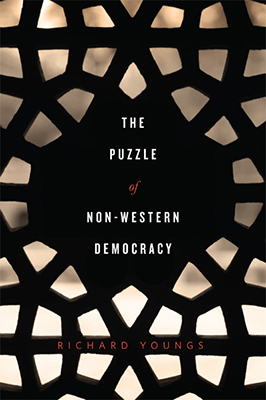It’s dangerous to dismiss Washington’s shambolic diplomacy out of hand.
Eric Ciaramella

The nature of today’s global politics calls for democratic renewal—and this renewal must look beyond the standard practices of Western democracy.
Calls for different models of democracy are becoming more prominent and widespread. The future of global politics will depend greatly on whether and how democracy can be made more effective, participative, and accountable. Many politicians, diplomats, and experts today argue in favor of non-Western models of democracy. Yet it remains unclear what such models should look like. It is more useful to think in terms of specific areas of democratic variation that can encourage democratic renewal—outside, but also within, the West.
Thinking about democratic variation should proceed along five axes. They are personal rights; economic justice; power-sharing mechanisms; alternative forms of civic action and representation; and legal pluralism.
Western and non-Western democracies (like Brazil, India, Indonesia, and South Africa) can and should cooperate on democratic variation. Rising democracies offer several advantages in encouraging political reform, but it is not yet clear if they have useful models of democracy to share with the rest of the world.
Mutual, two-way learning is required between Western and non-Western governments and civil society actors in pursuit of better-quality democracy. The supposed division between Western and non-Western political values is less than clear-cut. In the future there must be a greater variety of democratic forms—but this variety is unlikely to split neatly along a Western versus non-Western divide.
In this fresh, thoughtful, and timely work, Richard Youngs makes an original, thought-provoking, and profoundly clarifying contribution to the debate over “non-Western democracy.” He provides a rigorously analytical approach in a work of impressive scholarship that will be of enormous value to scholars, students, and practitioners around the world.
—Larry Diamond, senior fellow at Stanford University
In this nuanced and insightful book, Richard Youngs explores how understandings of democracy are changing and provides innovative ideas that should push Western analysts and diplomats toward a necessary rethink of democracy support.
—Ivan Krastev, chairman of the Center for Liberal Strategies, Sofia, Bulgaria
A well-timed assessment of an issue that is acquiring renewed visibility, offering an evenhanded agenda for more varied and tolerant forms of democracy.
—Laurence Whitehead, senior research fellow at Nuffield College, University of Oxford
Stimulating and much-needed insight into democratic experiments outside the West, with a well-informed account of the political realities that condition variations in democracy.
—Amr Hamzawy, professor of public policy at the American University in Cairo and former member of the Egyptian parliament
Carnegie does not take institutional positions on public policy issues; the views represented herein are those of the author(s) and do not necessarily reflect the views of Carnegie, its staff, or its trustees.
It’s dangerous to dismiss Washington’s shambolic diplomacy out of hand.

Eric Ciaramella
The India AI Impact Summit offers a timely opportunity to experiment with and formalize new models of cooperation.


Lakshmee Sharma, Jane Munga
EU member states clash over how to boost the union’s competitiveness: Some want to favor European industries in public procurement, while others worry this could deter foreign investment. So, can the EU simultaneously attract global capital and reduce dependencies?

Rym Momtaz, ed.
Europe’s policy of subservience to the Trump administration has failed. For Washington to take the EU seriously, its leaders now need to combine engagement with robust pushback.

Stefan Lehne
Leaning into a multispeed Europe that includes the UK is the way Europeans don’t get relegated to suffering what they must, while the mighty United States and China do what they want.

Rym Momtaz